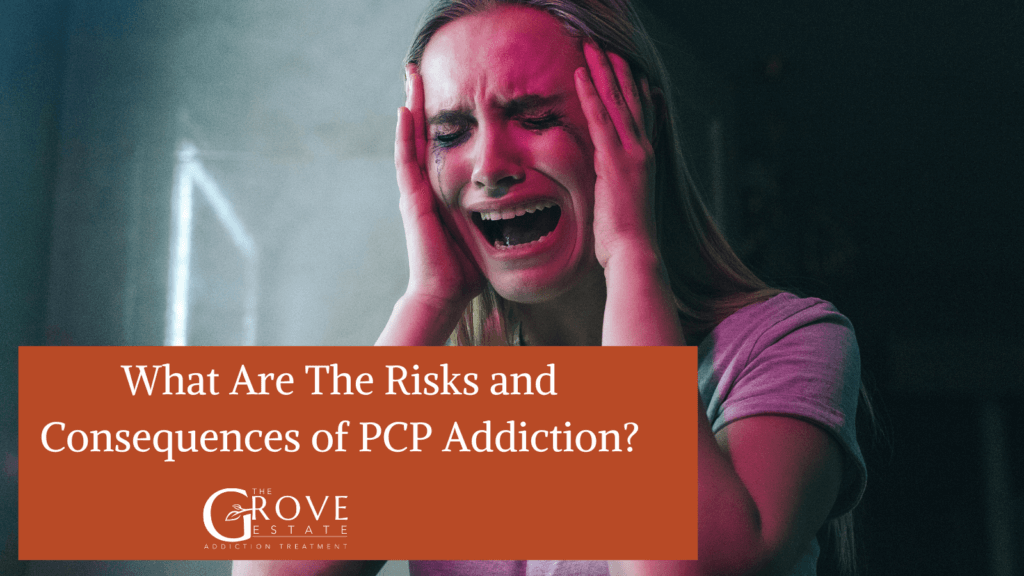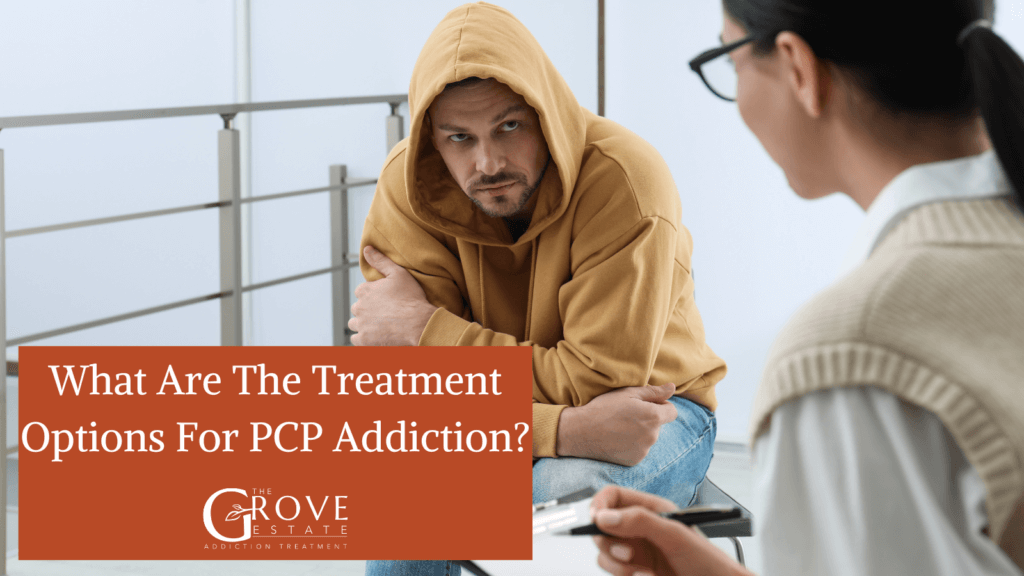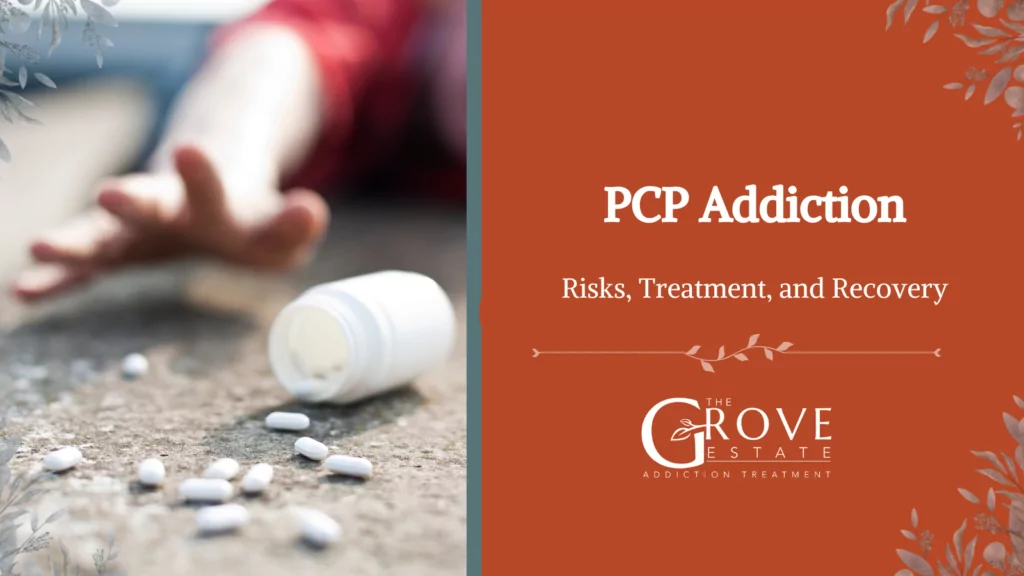Phencyclidine (PCP), also known as Angel Dust, is a dissociative hallucinogenic drug that was developed in the 1950s as a form of intravenous anesthetic. Medical use of the drug was discontinued because of high rates of delirium post-op. However, PCP has a long history of recreational and illegal abuse.
People with PCP addiction have a high tolerance for the drug and risk several physical and psychological injuries. Early discovery of this addiction makes it easier for the individual to seek treatment.
What is PCP?
Phencyclidine, or PCP, is a dissociative drug formerly used as an anesthetic agent. It was first synthesized in the 1950s, and was used in the 1960s and 1970s as an anesthetic, but was later discontinued because patients complained of delirium and hallucinations post-op. Now it is primarily known and used as a recreational, albeit illicit drug, with hallucinogenic and sedative properties.
PCP is commonly found in various forms such as powder, liquid, or tablets. It can be ingested orally, inhaled, or injected. The drug induces a range of effects including euphoria, dissociation from reality, distorted perceptions of sound and color, hallucinations, and a sense of detachment from the environment.
It also causes a range of adverse effects such as anxiety, aggression, paranoia, agitation, and psychosis.
Because of its high potential for abuse and addiction, PCP is classified as a Schedule II controlled substance in the United States. And although its recreational use has declined over time, it is still available in some illicit drug markets.
PCP or Angel Dust, is also used as a date rape drug because of its ability to sedate and impair judgment.
What is PCP Addiction?
PCP addiction refers to the compulsive and uncontrollable use of phencyclidine despite negative consequences on physical health, mental well-being, and other aspects of life. The long-term effect of PCP and other dissociative drugs is still been investigated, but research has shown that long-term use of PCP leads to tolerance and dependence, with associated withdrawal symptoms. People who abuse PCP are also at risk of developing an addiction to it.
Addiction to PCP, like addiction to other substances, involves changes in the brain’s chemistry and function, leading to a powerful urge to use the drug despite knowing its harmful effects.
Signs of PCP Addiction
According to the American Psychiatric Association (APA), in their Diagnostic and Statistical Manual of Mental Disorders (DSM-5, 5th edition), the signs of PCP use disorder include the following:
- Using increasing amounts of the substance over a longer period than intended.
- A strong overpowering craving to use the substance.
- Spending a huge amount of time in pursuit of the substance and recovering from its effects.
- Disregarding obligations due to using the substance.
- Neglecting personal and grooming habits.
- A continuing desire and unsuccessful attempts at quitting.
- Experiencing withdrawal symptoms such as cravings, depression, irritability, agitation, and insomnia when not using.
- Physical health issues such as weight loss, tremors, muscle rigidity, dental problems, respiratory issues, and cardiovascular complications.
Experiencing these signs does not mean an individual is addicted to PCP. They are indicative of substance use disorder, but only a medical professional can diagnose and, subsequently, treat PCP addiction.

What Are The Risks and Consequences of PCP Addiction?
Individuals with PCP addiction are at risk of a slew of effects. Here are some consequences of phencyclidine addiction:
Physical Health Problems
Chronic use of and addiction to PCP is linked to various physical health issues. According to Pradhan N.’s 1984 study, ‘Phencyclidine (PCP): Some human studies,’ chronic use of PCP is linked to several physical health issues including respiratory problems, cardiovascular complications, muscle rigidity, and seizures.
Mental Health Issues
Pradhan N.’s 1984 study, ‘Phencyclidine (PCP): Some human studies’ also links PCP abuse with significant mental health problems such as anxiety, depression, paranoia, hallucinations, and psychosis. It also induces psychotic episodes in psychotic and prepsychotic people.
Impaired Judgement and Functioning
Phencyclidine addiction impair cognitive function, decision-making abilities, and overall functioning in daily life, leading to difficulties at work, school, and in relationships. These range from failure to fulfill obligations to total abandonment of recreational, social, and employment activities.
Risky Behaviors
Because of impaired functioning, people addicted to PCP may engage in risky behaviors such as driving under the influence, unprotected sex, and criminal activities, increasing the likelihood of accidents, injuries, and legal consequences.

What Are The Treatment Options For PCP Addiction?
Treating PCP addiction typically involves a combination of therapeutic approaches tailored to the individual’s needs. Some common treatment options for PCP addiction include:
Medical Detoxification
The first step in treating PCP addiction is often detoxification, during which the drug is safely removed from the individual’s system. There are no clear-cut detox protocols for PCP addiction, and the process is usually tailored to each individual. Medical supervision is necessary to manage withdrawal symptoms.
Behavioral Therapy
Various forms of behavioral therapy, such as cognitive-behavioral therapy (CBT), contingency management, and motivational interviewing, have proven useful in the management and effective treatment of PCP addiction. These therapies help individuals identify and change unhealthy thoughts and behaviors related to drug use, set goals for recovery, and develop coping skills.
Group and Family Therapy
Participating in therapy with peers and family members provides support and encouragement while improving communication among family members and a sense of camaraderie among peers. This form of therapy helps ingratiate the individual back into the community by providing a form of support system.
What is The Recovery Process for PCP Addiction?
Recovery starts with acknowledging the presence of addiction and accepting the need for help. It spans through the process of seeking professional help, and the various treatment options.
However, like every substance use disorder, there is a chance of relapse. Even after treatment, individuals must make certain changes to their lifestyle. These changes include engaging in regular exercise, practicing stress-reduction techniques such as mindfulness or meditation, eating a balanced diet, getting adequate sleep, and avoiding triggers and situations that may lead to relapse.
A great way to get valuable support and encouragement after treatment is to participate in support groups such as Narcotics Anonymous (NA).
Recovering from PCP addiction takes time and effort, but it is possible with the right support and resources.
How does PCP addiction affect brain chemistry and function?
PCP addiction alters neurotransmitter systems, leading to addiction, cognitive impairment, and mental health issues.
Can PCP addiction cause long-term physical health problems?
Yes, chronic PCP use can result in respiratory issues, cardiovascular complications, muscle rigidity, dental problems, and neurological damage, impacting overall health.
Is PCP addiction treatable, and what are the most effective treatment approaches?
Yes, PCP addiction is treatable. Effective treatments include detoxification, behavioral therapies like CBT, medication-assisted treatment, and aftercare planning tailored to individual needs.
Are there any specific risk factors for developing PCP addiction?
Risk factors include genetic predisposition, early drug exposure, trauma history, mental health disorders, polysubstance use, and environmental factors.
What role do support groups play in PCP addiction recovery?
Support groups like NA or SMART Recovery offer peers’ support, guidance, accountability, and motivation, aiding individuals in their recovery journey.
How does PCP interact with other medications and substances?
The interaction between PCP addiction and other medications or substances can significantly increase the risk of adverse effects and overdose. According to WebMD, combining PCP with depressants like alcohol or benzodiazepines can lead to severe respiratory depression, coma, or even death. On the other hand, mixing PCP with stimulants such as cocaine or stimulant addiction drugs can cause unpredictable and potentially dangerous increases in blood pressure and heart rate.
It’s crucial for individuals with a history of PCP use to inform healthcare providers about their drug use when receiving treatment for any condition. Medical professionals can adjust the treatment plan to minimize risks, emphasizing the importance of considering all potential interactions to ensure patient safety.
Can lifestyle changes aid in the recovery from PCP addiction?
Lifestyle changes play a crucial role in the recovery from PCP addiction. Incorporating healthy habits such as exercise and nutrition into one’s daily routine can support the body’s healing process and improve mental health. Exercise releases endorphins, which can reduce cravings and improve mood, while a balanced diet can help repair the damage caused by long-term drug use. According to WebMD, engaging in regular physical activity and eating a nutrient-rich diet can also enhance overall well-being and provide the energy needed to participate in treatment and recovery activities.
Additionally, establishing a structured daily routine, including adequate sleep, stress management practices, and social activities, can help individuals in recovery build a new, substance-free life. Creating a supportive environment that encourages these healthy lifestyle choices is essential for sustaining long-term recovery from PCP addiction.

Share This Post



